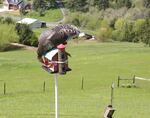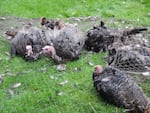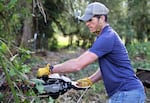
Wild turkeys can become a problem, especially when their numbers grow. This one in Yamhill County has figured out how to eat out of a wild bird feeder.
Courtesy of Oregon Department of Fish and Wildlife
Retiree Chenaya Strutton recently found herself driving through a very nice housing development in Reedsport, on the central Oregon coast. On the side of the road was a flock of wild turkeys, so she stopped to take a picture.
“One male came over and saw his reflection in my hubcap and he started attacking his reflection,” Strutton said. “You know, flying up, hitting it with his spurs and flapping and everything.”
Turkey activity begets turkey activity, so by the time she tried to leave there were 30 birds clustered around the car.
“So for quite a while we sat in this huge mass of turkeys and watched them attack our hub caps,” she said.

Chenaya Strutton stopped to take pictures of wild turkeys and one started attacking its reflection in her hubcaps.
Kristian Foden-Vencil / OPB
Reedsport is not the only town where Oregon’s wild turkey population is living up to its adjective. In Jefferson, flocks have been pecking at cars and uprooting plants. In Eugene, they’ve been pooping on lawns. And near Moro, a woman died after a wild turkey hit her motorcycle.
The Oregon Department of Fish and Wildlife gets about 160 complaints about wild turkeys every year. Brandon Dyches, who manages the agency’s Hunt By Reservation program, said many of those complaints are non-trivial.
“A few hundred birds get on your roof, that’s a lot of weight. I’ve seen sheds damaged” said Dyches, who is employed by the nonprofit Pheasants Forever which partners with ODFW. “I’ve seen tons of turkey scat. If farmers plant seeds and those seeds start to germinate, turkeys love to eat that. ... I’ve seen vineyards have turkeys jump up and eat grapes. Turkeys have a varied ability to cause havoc.”

In this 2018 photo provided by the Department of Fish and Wildlife, wild turkeys in Douglas County are trapped with a net. When a flock of wild turkeys builds past the point of tolerance, the fish and wildlife district office determines if they can be successfully trapped and relocated.
Courtesy of the Oregon Department of Fish and Wildlife
Turkeys aren’t native to Oregon. Domestic birds were introduced by pioneers in the 1890s, but they didn’t take to the wild. Then in the 1960s, wild turkeys from Texas were brought in to create hunting opportunities and they’ve been thriving ever since.
The birds can eat almost anything, from acorns to snails, and live almost anywhere, from golf courses to residential areas – especially if there’s a well-stocked bird feeder.
Just how much damage they do to native species isn’t clear. But Bob Sallinger with Portland Audubon isn’t too worried.
“We generally do not consider them a threat to the environment (plants or native species),” Sallinger wrote in an email. “The conflicts I am aware of relate to agricultural impacts, property damage and occasionally aggressive behavior toward people.”
Turkey aggression and other problems are why the Oregon Department of Fish and Wildlife is now piloting the Hunt By Reservation program to link hunters with farmers that have turkeys on their land.

Retired Albany farmer, Loren Gerig, right, clears brambles away with the help of a team of hunters in August.
Kristian Foden-Vencil / OPB
On a recent Saturday morning, Dyches and a team of hunters helped Albany farmer Loren Gerig clear brambles out of a goat pasture.
“We’re moving some 70-year-old fencing from the ground,” Dyches said. “And it’s just a job that no one man should undertake.”
The hunters are volunteering as a thank-you for being allowed to hunt on Gerig’s farm — one of many in the state where people can reserve a time to hunt. People don’t have to volunteer if they want to hunt turkeys on farms. They can just go online to the state’s Hunt By Reservation website, find a location and pay. A hunting license is about $35 and a turkey permit is about $27.
At first, Gerig was worried about the liabilities involved with letting hunters onto his property. He worried they wouldn’t close gates or would trample his fences.
Also, the dozen or so wild turkeys on his land haven’t been a problem. They just eat the acorns and windfall apples. But he decided to allow hunting because he’s heard the horror stories and he doesn’t want his flock to get out of hand.
“I thought I would stick my neck out a little bit. And I’m glad that I did,” Gerig said.
Gerig is pleased the hunters helped him clear land and that they seem to be keeping the turkeys under control.

Hunt By Reservation coordinator Brandon Dyches, helps clear brush at an Albany farm to show appreciation for hunters being allowed to hunt on the property in August.
Kristian Foden-Vencil / OPB
Dyches first picked up hunting to learn more about where our food comes from and said wild turkey tastes fantastic.
“My wife, she will tell you that she prefers wild turkey,” he said. “My view is: It’s turkey taste, times two. It’s just intense, pure wild turkey with none of the weirdness that comes with factory animals.”
There are two turkey seasons, one in fall and the other in spring. And unlike some deer hunting, participants don’t have to scent themselves with urine. Hunting wild turkeys involves setting up in a camouflaged situation and then using calls to attract the birds. Those calls can be made by mouth or wood scratched on a piece of slate.

Clayton Chambers lives in Portland, works at Nike, and didn’t grow up hunting. But he wanted to learn about wild food. So he took hunter education classes through the Oregon Department of Fish and Wildlife.
Kristian Foden-Vencil / OPB
Clayton Chambers lives in Portland, works at Nike, and didn’t grow up hunting. But he also wanted to learn about wild food. So he took hunter education classes through the state and now feels like he sees turkeys everywhere.
“Just driving down you’ll see two dozen birds in somebody’s yard,” Chambers said.
But he doesn’t just jump out of the car to bag a bird.
“You don’t want to go and just kinda plink one out of the garden,” Chambers said. “You want to have the full turkey experience, right? And there’s something about being out kind of in the forest, in the woods, versus just going out and harvesting a bird in a backyard.”
The number of turkey complaints made to the state has dropped 15 percent over the last year. But that drop isn’t necessarily caused by the new hunter-farmer partnerships available under the Hunt By Reservation program, said ODFW game coordinator Mikal Cline.
“Correlation doesn’t mean causation,” Cline said.
What does seem clear, at least for the hunters and farmers interviewed for this story, is that the new system allows for both groups to get a little more, or less, of what they want.
Oh, and if you’re hoping for some “turkey taste times two” at Thanksgiving, pulling out your phone to order one won’t work. If you want a wild turkey on your table this fall, you’ll either have to learn how to hunt or befriend a hunter with the skill to bag enough birds. There is a five birds maximum each year.

Albany farmer Loren Gerig was worried about the liability of letting hunters use his land. But he's been pleased with their help clearing brush and keeping his turkey flock under control, August 2022.
Kristian Foden-Vencil / OPB
